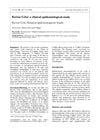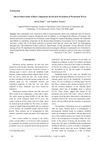 43 citations,
October 1955 in “The journal of nutrition/The Journal of nutrition”
43 citations,
October 1955 in “The journal of nutrition/The Journal of nutrition” Germ-free rats need biotin for growth and have different vitamin metabolism compared to regular rats.
 24 citations,
March 1998 in “Mycoses”
24 citations,
March 1998 in “Mycoses” Early diagnosis and effective treatment of kerion Celsi prevent scarring and permanent hair loss.
 22 citations,
December 2010 in “Journal of Cosmetic Dermatology”
22 citations,
December 2010 in “Journal of Cosmetic Dermatology” Finasteride may increase depression by reducing brain cell growth.
 21 citations,
April 2010 in “Molecular Medicine Reports”
21 citations,
April 2010 in “Molecular Medicine Reports” Zinc supplementation may help improve treatment outcomes for chronic hepatitis C.
 20 citations,
January 2012 in “International journal of trichology”
20 citations,
January 2012 in “International journal of trichology” Steroids are the best treatment for Alopecia Areata with few side effects.
 16 citations,
October 2015 in “Photochemistry and photobiology”
16 citations,
October 2015 in “Photochemistry and photobiology” Reducing copper (II) ion levels in hair can decrease hair damage.
 15 citations,
September 2015 in “Journal der Deutschen Dermatologischen Gesellschaft”
15 citations,
September 2015 in “Journal der Deutschen Dermatologischen Gesellschaft” Skin doctors should recognize and treat conditions like hair-pulling and skin-picking early, often using therapy and medication, to help 50-70% of patients.
 9 citations,
March 2013 in “ISRN Stem Cells (Online)”
9 citations,
March 2013 in “ISRN Stem Cells (Online)” Skin stem cells were turned into heart cells using a chemical, suggesting a new way to treat heart attacks.
 7 citations,
January 2019 in “Annals of dermatology/Annals of Dermatology”
7 citations,
January 2019 in “Annals of dermatology/Annals of Dermatology” Synthetic ceramides may help hair growth by boosting cell growth in hair follicles.
 7 citations,
September 2008 in “Dermatologic surgery”
7 citations,
September 2008 in “Dermatologic surgery” Hair transplantation can successfully treat stubborn alopecia areata.
 6 citations,
July 2015 in “European Journal of Dermatology”
6 citations,
July 2015 in “European Journal of Dermatology” Stopping methotrexate might reverse lymphoma-like conditions in some patients.
 6 citations,
March 2014 in “Annals of Pharmacotherapy”
6 citations,
March 2014 in “Annals of Pharmacotherapy” A woman's hair loss was probably caused by the antifungal drug anidulafungin.
 5 citations,
November 2011 in “Expert Review of Dermatology”
5 citations,
November 2011 in “Expert Review of Dermatology” The document concludes that early diagnosis and a comprehensive treatment plan are crucial for managing hair loss in children, with a focus on both medical and psychological support.
 5 citations,
January 1998 in “Clinical and experimental dermatology”
5 citations,
January 1998 in “Clinical and experimental dermatology” Myotonic dystrophy should be considered in patients with hair thinning, and genetic counseling is important.
 4 citations,
October 2007 in “Dermatologic Clinics”
4 citations,
October 2007 in “Dermatologic Clinics” Glucocorticoids and sex hormones affect skin health, with potential for targeted treatments to minimize side effects and treat skin conditions.
 3 citations,
January 2010 in “Elsevier eBooks”
3 citations,
January 2010 in “Elsevier eBooks” The document describes various skin conditions, their features, and treatments but lacks detailed study size information.
 2 citations,
November 2011 in “InTech eBooks”
2 citations,
November 2011 in “InTech eBooks” Most adrenal cortex tumors are benign and non-secreting, but proper diagnosis and treatment are important due to the rare possibility of cancer.
 1 citations,
October 2014 in “Skin Pharmacology and Physiology”
1 citations,
October 2014 in “Skin Pharmacology and Physiology” People with alopecia areata have higher levels of osteopontin, which might be important in the disease's development, but this doesn't relate to how severe the disease is.
 1 citations,
July 2011 in “Climacteric”
1 citations,
July 2011 in “Climacteric” Long-term estrogen therapy in postmenopausal women can improve certain health markers, hair loss is common regardless of hormone use, stopping estrogen doesn't increase breast cancer risk, smoking does, and a balanced BMI is linked to lower mortality.
 January 2025 in “International Journal of Advanced Research in Science Communication and Technology”
January 2025 in “International Journal of Advanced Research in Science Communication and Technology” Polyherbal hair dyes are safer and more eco-friendly than chemical dyes.
 April 2021 in “Sohag Medical Journal”
April 2021 in “Sohag Medical Journal” Alopecia areata is an autoimmune condition causing hair loss, linked to genetic factors and immune system issues, with no cure yet.
 September 2018 in “Facial Plastic Surgery Clinics of North America”
September 2018 in “Facial Plastic Surgery Clinics of North America” Biologicals are increasingly used in medicine and cosmetics, especially for skin and hair treatments, but more research is needed.
 January 2013 in “Sen'i Gakkaishi”
January 2013 in “Sen'i Gakkaishi” Microfibrils are key for permanent waves, and hydrolyzed keratin improves wave formation and hair condition.

Resveratrol improved hormone levels, menstrual cycles, hair loss, and ovarian function in PCOS patients.
 April 2021 in “Journal of Investigative Dermatology”
April 2021 in “Journal of Investigative Dermatology” The research found genes that may protect certain scalp cells from hair loss.
 January 2021 in “Clinical dermatology open access journal”
January 2021 in “Clinical dermatology open access journal” Dermatologists in Western Rajasthan often prescribe doxepin for elderly patients with skin and mental health issues.
 April 2018 in “The journal of investigative dermatology/Journal of investigative dermatology”
April 2018 in “The journal of investigative dermatology/Journal of investigative dermatology” Aging causes changes in scalp cells that can negatively affect hair health.
 April 2018 in “The journal of investigative dermatology/Journal of investigative dermatology”
April 2018 in “The journal of investigative dermatology/Journal of investigative dermatology” Researchers found a new way to isolate sweat glands from the scalp for study and culture.
 165 citations,
January 2014 in “Dermatology Research and Practice”
165 citations,
January 2014 in “Dermatology Research and Practice” Zinc is effective for treating various skin conditions, including warts and acne.
 144 citations,
November 2020 in “Frontiers in immunology”
144 citations,
November 2020 in “Frontiers in immunology” Targeting the IL-23/IL-17 pathway effectively treats several inflammatory skin diseases.






























